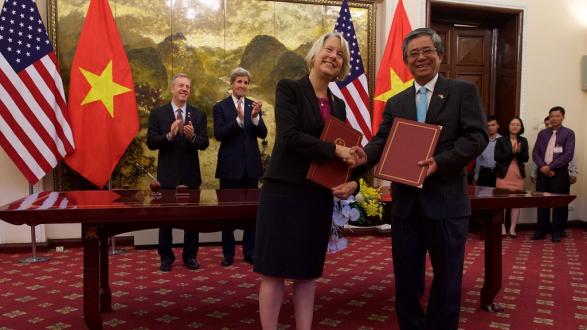In:
Global Beat is your weekly stop for news from around the world. Join us every Friday morning for important stories you should know about.
This week, the Peace Corps will be established in Vietnam for the first time in history; Santiago’s subway system will become the world’s first solar-powered metro; Greece and Kenya move to close down refugee camps; and more.
____________________
Americas
Metro de Santiago, the subway system in Santiago, Chile, will soon become the world’s first solar-powered metro system. Forty-two percent of energy generated for the subway’s operation will come from a solar plant ready to be built by California-based company SunPower, while 18 percent of the energy will be derived from wind power. It’s the second biggest subway service in Latin America, after Mexico City.
Also check out:
- Transgender Bolivians get an unlikely bit of good news – Megan Alpert, Foreign Policy
Central & South Asia
On Sunday 94.5 percent of eligible voters in Tajikistan approved 41 constitutional amendments, including allowing President Emomali Rakhmon – who has been in office since 1992 – to run for president indefinitely. The vote also banned political parties based on religion and lowered the age limit to run for president, clearing the way for Rakhmon’s 28-year-old son to succeed him. Many observers believe the vote was manipulated.
Also check out:
- A simmering conflict with the Kurds threatens to consume Turkey and inflame an already-unstable region – Robert Worth, The New York Times
China & East Asia
China warned President Obama not to spark a “regional tinderbox” after he lifted a decades-long arms embargo to Vietnam. An editorial in the Communist Party paper China Daily said the move was meant to “curb the rise of China. This, if true, bodes ill for regional peace and stability.” During his remarks announcing the lift of the embargo, President Obama downplayed the notion that it was a move to counter China in the South China Sea.
Also check out:
- South Korea welcomes group of defectors from North Korea – Deutsche Welle
Europe & Russia
Greece began evacuating thousands of refugees and migrants from a squalid, informal camp near the border with Macedonia. The camp houses about 10,000 people. Police brought in bulldozers to knock down tents and buses to relocate the asylum-seekers to state-run camps. Many of the camp residents were families, children, newborns, and pregnant women.
Also check out:
- The world is ‘unprepared to cope’ with emerging infectious diseases, says WHO director-general at the 69th World Health Assembly – Lisa Schlein, Voice of America
Middle East & North Africa
A U.S. drone strike killed Afghan Taliban leader Mullah Akhtar Muhammad Mansour in Pakistan. American officials did not notify Pakistani officials of the strike beforehand, highlighting the complicated relationship between the two countries. The Pakistani Foreign Ministry said the act was a "violation of Pakistan’s sovereignty."
Also check out:
- Terrorism’s devastating impact on tourism in Tunisia – Jeremy Armstrong, Mirror
Southeast Asia & Oceania
The Peace Corps will finally establish its official presence in Vietnam with a program initially focusing on English language education in Ho Chi Minh City and Hanoi. This symbolic action highlights the strengthening relationship between the two nations. President Obama visited Vietnam earlier this week, becoming the third president to do so since the conclusion of the Vietnam War in 1975. During his visit the president lifted the arms embargo on the country and urged Vietnam to advance human rights and freedoms.
Also check out:
- The search for truth in Khmer Rouge-era bones – Lauren Crothers, Anadolu Agency
Sub-Saharan Africa
Kenya announced that it will close the world’s biggest refugee camp this year, but some NGOs and analysts say it is nothing more than a "cynical" ploy to trigger more international aid. The Dadaab camp hosts more than 300,000 people, mostly Somalis fleeing conflict in that country. The UN and Western states said forcibly repatriating the refugees would violate international obligations. Kenya cited radicalization by extremist elements in the camp as the main reason for the closure.
Also check out:
- Could Angola’s first banana exports in 40 years save its economy? – Lynsey Chutel, Quartz




